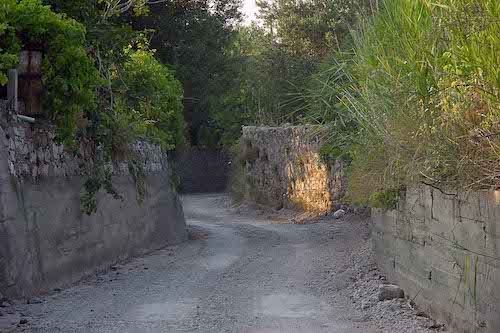Last week the Greek paper Ekathimerini wrote that Lesvos belonged to the top-three destinations world wide for bird watchers. The island is very popular with migratory birds, who come to Lesvos in big numbers, maybe preferring the island over Turkey, which is at the other side of the water, where the Asian peninsula starts.
What most of the summer tourists do not know, but the birds do, is that Lesvos is a water paradise. When the Gods reward the island with waters from heaven, mostly in winter, the water descends through rivers and smaller streams towards the sea. It goes over mountain slopes, winds itself through valleys downwards, sometimes falling elegantly off the rocks. Lesvos has plenty of waterfalls, like Mankatsa waterfall not far from Mandamados, the one at Pesas that runs dry in summer (and has a neglected park surrounding it), the very old looking waterfall of Klapados and the subtropical waterfall Vathilimno between Chidera and Pterounda.
The island even used to have two lakes: Megali Limni and Mikri Limni. The Romans built an aqueduct, transporting water from these reservoirs to Mytilini. Around 1823 the Turkish Aga Mustafa Kulaxis was bored by all that water and, as a punishment for a failed revolt, had the inhabitants from around Agiasos drain part of the lakes in order to create fertile earth. Later the Church bought the region from the Turks. Only in 1929 were the lakes completely drained dry by a cooperative from Agiasos who disowned the lands and lakes in order to distribute it among farm workers not owning any land. The many small houses now standing around the enormous open space in between evergreen pine woods stands as evidence that even now many different owners work on those lands.
Here or there you might find a little pond, but the only remaining big lakes on Lesvos are the water reservoirs, like the one above Plomari, the Sedountas reservoir and the charming reservoir in front of the Pithariou monastery near Eresos. Molyvos also has a reservoir, that most of the time leaks like a colander and now only serves as a Valhalla for water birds and bird watchers.
In the course of time water that reached the coasts formed small estuaries, some of them swamps. Lesvos counts nearly a hundred of such swamps. Situated mainly around the Gulf of Kalloni, where you have to be careful not to get wet feet. There you also find the salt pans resting in the swampy grounds and the main regions for bird watchers.
Most of the rivers run dry in the summer; what can be an advantage. Plomari as well as Skala Eresos use a dry river bed as street and or parking space. Even more impressive are the dry river streets created in the Kampos of Gavathas and the one of Perama. They lie meters below the gardens, meandering towards the sea between high walls that are are decorated with sprawling plants, like capers or aerial roots or lianas where you half expect Tarzan to pop up at any moment. The compressed vegetive and plastic waste stuck between trees and bushes show clearly how high the wild waters can rise in the winter.
The gardens in the Kampos and other outer regions are the allotments of Lesvos. They have very old olive groves, blinking lemon, orange and tangerine trees, but also vegetable gardens that now, in the winter, are filled with enormous cabbages, leek, beetroots, salads and whatever the winter brings. The sight of them makes me feel both greedy and jealous because of the green fingers that know how to get food out of the earth. I am sure it is here where paradise was created – at least the name. The Greek historian Xenophone put two Persian words together, ‘peri’ and ‘daeza’, thus obtaining paradisos (παράδεισος), meaning walled enclosure.
There remain plenty of walled paradise gardens, like the sweet smelling orange groves in the Kampos on Chios, but on Lesvos most of them can be openly admired. Especially in the winter it is a joy to walk along these paradises, like in the green hinter land of Kagia or Yeni Limani, where you also find plenty of small gardens and small country houses. In fact, the whole island is full of these little gardens, especially in the lower areas along the sea (and the Gulfs): thousands of little plots of black earth, near little streams that in winter run like merry little rivers.
Mostly it is the elderly that you see bowed over these fertile grounds and I wonder how long these paradises will keep on existing. How many Greek youngsters know how to grow a cauliflower, leeks or know how to harvest spinach? How many of these young people do still like to work in gardens? It is good that the olive trees now provide good money and hopefully because of that the vegetable gardens will also remain. For the moment these little gardens are still there to seduce you. And the birds? They know exactly where to go.











